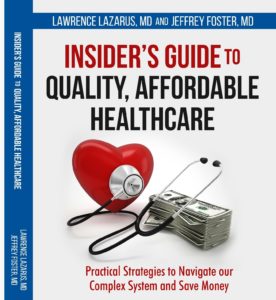 This article is an excerpt from Insider’s Guide to Quality, Affordable Healthcare, by Lawrence Lazarius, MD and Boulder County resident, Jeffrey Foster, MD.
This article is an excerpt from Insider’s Guide to Quality, Affordable Healthcare, by Lawrence Lazarius, MD and Boulder County resident, Jeffrey Foster, MD.
Hospitals treat and cure illnesses but also can pose some health risks. There are ways to maximize the positive and minimize the negatives. In particular, the risks include hospital-acquired infections and errors in giving medications. These risks occur whether the hospitalization was elective or an emergency. This article focuses particularly on strategies for elective admissions.
Preparing for Your Stay in the Hospital
First, where possible try to choose the hospital that is best for you and is accredited by the JCAHO (Joint Commission on the Accreditation of Healthcare Organizations). For example, should you need heart or other complicated surgery, consider a hospital known for their expertise in this specialty.
Second, know that in most hospitals, you’re assigned to a specially trained physician, known as a hospitalist, who is usually an internist specializing in hospital medicine. This doctor is trained to efficiently get you all the hospital services and treatment that you need and to communicate with your primary care physician.
It’s advisable that your close family members, patient advocate (if you have one), and all the healthcare professionals involved in your care communicate with one another. You may want to designate one family member (and an alternate) to serve as your assistant “communicator,” with your permission to talk with your doctors and hospital staff and keep family members informed of your progress.
Other preparatory steps:
-
- Make sure your outpatient medical records are available to the hospitalist;
- Get in good physical and mental shape (limit use of alcohol and tobacco);
- Obtain from the business office an estimate of all the hospital, physician, and other costs associated with your hospital stay. Get an estimate of costs likely to be paid by your primary and secondary insurance and what might be your out-of-pocket costs (assuming no complications);
- If you need post-hospital rehabilitation or nursing home care, will these services be “in-network”?
- Bring to the hospital all insurance cards, your personal health record (PHR), and healthcare documents (i.e., living will, powers of attorney);
- Request that family and friends who are sick, or slightly “under the weather,” refrain from visiting you. Limit visitors so you use your energy to get well.
Paths to the Best Care Possible
-
- Have the hospital staff see you as a real person. For example, have a picture of you and your loved ones by your bedside;
- If you have a patient “advocate” (i.e., family member, friend, or from an agency), introduce him/her to hospital staff and explain his/her role;
- Soon after admission, forge a relationship with a hospital “troubleshooter” whom you (and your advocate) can turn to when some aspect of your hospitalization is confusing.[1] Hospitals also have knowledgeable, employed hospital representatives (facilitators) who can answer your questions;
- Your hospitalist and his/her assistants will have brief visits with you so be prepared in advance by keeping an ongoing list of questions.
Avoiding Infections
One of the gravest risks of hospitalization, especially long hospital stays, is contracting a hospital-acquired infection. The best safeguard is you, the patient! So, frequently wash your hands with soap or sanitizing gel. Be observant to remind all hospital staff to do likewise. Antibacterial gel is actually discouraged because it is no more effective than soap and may lead to antibiotic-resistant bacteria strains.
Other safeguards that reduce the risk of infection include: [2]
-
- Washing your hands especially well before going to bed and after visits to the bathroom;
- Avoiding touching your surgical wound or intravenous site;
- Making sure your wound dressing, drainage tubes, and catheter sites are dry. Alert your nurse if they become loose or wet;
- Wipe with sanitizing gel the TV remote, your handheld device, cell phone, and toilet seat and lever before using them;
Avoiding Medication and Other Errors
-
- Even though hospitals have adopted effective protocols to avoid medication errors, be inquisitive and hyperalert.[3]
- Before being given medication, staff will check that you are the correct person by confirming your identity. You may periodically ask for a copy of your most current medication record to be familiar with medication names and dosages.
- Since the majority of medically-related errors occur during periods of transition, such as nursing and doctor shift changes, or when the hospital is less well staffed during holidays, be especially observant during these transitions. [4]
Preparing for a Safe Return Home
Since hospital stays are often shorter than you may anticipate, you should:
-
- Make as many preparations as possible with assistance from your discharge coordinator before exiting the hospital. Examples are getting authorization from your insurer should you need home health services or transfer to another facility;
- Obtain copies of your hospital records (or at least a summary) prior to discharge so you can share them at your follow-up appointments with your doctor and other health professionals. Request records be sent to all your health professionals ASAP so transition of information is seamless. Add your copy to your Personal Health Record (PHR) or medical records folder;
- Know exactly what medications to take and which ones taken prior to hospitalization to stop.
Following these strategies and involving selected family and friends as important members of your healthcare team, will help ensure a successful hospital stay.
Sources:
-
- Editors of Consumer Reports. (2015, March 8). Consumer Reports: Path to the best possible hospital care. Retrieved form http://www.post-gazette.com/business/money/2015/03/08/Consumer-Reports-Path-to-the-best-possible-hospital-care/stories/210503050202
- National Center for Emerging and Zoonotic Infectious Diseases. (2017, March 13). Getting Medical Care? How to Avoid Getting an Infection. Retrieved fromThe CDC
- Eustice, C. (2016, April 1). How You Can Avoid Medication Errors. Retrieved from https://www.verywell.com/how-to-avoid-medication-errors-188068
- 14 worst hospital mistakes to avoid. (2012, June 25). Retrieved from http://www.nbcnews.com/id/47954577/ns/health-health_care/t/worst-hospital-mistakes-avoid/#.W5SUz0hKiUk
About the Authors
Lawrence W. Lazarus, M.D.  has specialized in geriatric medicine and psychiatry at Rush Medical School and University in Chicago, Illinois, where he founded the Geriatric Psychiatry Fellowship Program. He is a former president of the American Association for Geriatric Psychiatry and was awarded numerous teaching and research grants from the National Institute of Mental Health. Dr. Lazarus is in private practice in Santa Fe, New Mexico.
has specialized in geriatric medicine and psychiatry at Rush Medical School and University in Chicago, Illinois, where he founded the Geriatric Psychiatry Fellowship Program. He is a former president of the American Association for Geriatric Psychiatry and was awarded numerous teaching and research grants from the National Institute of Mental Health. Dr. Lazarus is in private practice in Santa Fe, New Mexico.
 Jeffrey Foster, M.D. has spent his clinical and academic career with Geriatric Psychiatry as a prominent focus. He has worked closely with primary care physicians, nurses, social workers and various specialists in hospital and outpatient settings. A former President of the American Association of Geriatric Psychiatry, Dr. Foster has received various teaching and research grants from the National Institute of Mental Health.
Jeffrey Foster, M.D. has spent his clinical and academic career with Geriatric Psychiatry as a prominent focus. He has worked closely with primary care physicians, nurses, social workers and various specialists in hospital and outpatient settings. A former President of the American Association of Geriatric Psychiatry, Dr. Foster has received various teaching and research grants from the National Institute of Mental Health.
For more information:
- Dr. Jeffrey Foster; jeffoster1@gmail.com
- Quality Affordable Healthcare

